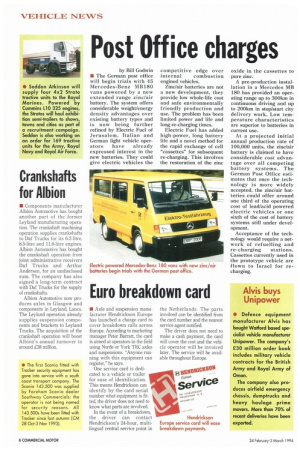Post Office charges
Page 10

If you've noticed an error in this article please click here to report it so we can fix it.
by Bill Godwin • The German post office will begin trials with 45 Mercedes-Benz MB180 vans powered by a new extended range zinc/air battery. The system offers considerable weight/energy density advantages over existing battery types and is now being further refined by Electric Fuel of Jerusalem. Italian and German light vehicle operators have already expressed interest in the new batteries. They could give electric vehicles the competitive edge over internal combustion engined vehicles.
Zinc/air batteries are not a new development, they provide low whole-life cost and safe environmentally friendly production and use. The problem has been limited power and life and long re-charging times.
Electric Fuel has added high-power, long battery life and a novel method for the rapid exchange of cell "cassettes" for subsequent re-charging. This involves the restoration of the zinc oxide in the cassettes to pure zinc.
A pre-production installation in a Mercedes MB 180 has provided an operating range up to 300km in continuous driving and up to 200Icm in stop/start city delivery work. Low temperature characteristics are superior to batteries in current use.
At a projected initial annual production rate of 100,000 units, the zinc/air battery is claimed to have considerable cost advantage over all competing battery systems. The German Post Office estimates that once the technology is more widely accepted, the zinc/air batteries could offer around one third of the operating cost of lead/acid powered electric vehicles or one sixth of the cost of battery systems still under development.
Acceptance of the technology would require a network of refuelling and re-charging stations. Cassettes currently used in the prototype vehicle are flown to Israel for recharging.




















































































